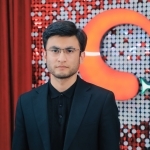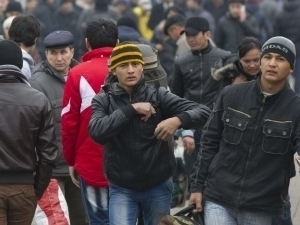Syria's future under Jolani: Reform or repetition?
Review
−
26 December 2024 11023 13 minutes
The Assad regime, which has been repressive for more than half a century, has been surviving in recent years thanks to the beneficial support of Iran and Russia. But Russia and Iran, weakened by long and costly conflicts in their regions, have deprived Assad of any lifelines. Russia’s preoccupation with Ukraine and Iran’s preoccupation with Israel through its proxy groups has given the anti-regime forces a great deal of time and opportunity.
It took Hayat Tahrir al-Sham, the most powerful armed group in Syria, just 10 days to overthrow Assad. The uprising, which began on November 27, ended on December 8 with the arrival of forces led by Jolani in Damascus. Having appeared on the big stage since 2013, initially portrayed as a terrorist by his views and actions in front of the whole world, Joloni immediately became a politician who was aware of diplomatic etiquette, open to the outside world, and to some extent liberal.
Of course, his behavior did not appear yesterday or today. Joloni occasionally used the classic style to present himself in a positive way in the eyes of the West and liberal political centers. Now he has become a leader who is always in a suit and trousers, with a beard and a neat hairstyle. His political career as a head of state, a full member of the legal and international law, has not yet begun. However, there is no reason to believe that the 42-year-old Joloni, who has become the de facto new leader of Syria, will not become the country's president in the future. As 2024 draws to a close, humanity has witnessed many political processes and sharp conflicts throughout the year.
In general, it would not be an exaggeration to say that 2024 was a year of massacres and uncompromising political struggles. But if we focus on individuals in politics, we can safely call Jolani, who burst onto the political scene in the last month of the year, the discovery of the year. Below we will talk about his current role and significance in Syria, and how the new leader of 20 days is doing.
The world recognizes him
After the forces led by Jolani overthrew Assad, the outside world had no other option for establishing dialogue with Syria. So, shortly after the coup, or rather, exactly 10 days later, most of the world's countries began to open up to negotiations with the person they had declared a terrorist. On December 16, the leader of the Hayat Tahrir al-Sham group met with British representatives and called for the lifting of sanctions against Syria. In addition, the return of Syrian refugees to their homes was also discussed during the meeting. After meeting with British diplomats, it was announced that he planned to meet with representatives of France and Germany, and expressed his readiness to cooperate with other Western countries.
A day later, on December 17, the UN Under-Secretary-General for Humanitarian Affairs, Tom Fletcher, met with the new Syrian leaders in Damascus. Significantly, the UN representative noted that he was “inspired” after this meeting and that “there is a basis for significantly expanding the scope of life-saving humanitarian assistance.” Meanwhile, it was also reported that the European Union would reopen its diplomatic mission in Damascus to continue relations with the new Syrian authorities. On December 17, German diplomats in Damascus also established direct contact with Jolani for the first time. It was reported that the European Union’s High Representative for Foreign Affairs and Security Policy, Kaya Kallas, had sent an experienced diplomat to Damascus to establish relations with the new Syrian leader. It was also reported that the UN Secretary-General’s Special Representative for Syria, Geir Pedersen, had also held talks with Jolani.
It was also reported that Turkish President Recep Tayyip Erdogan would meet with Jolani in person soon, approximately in the next two weeks. According to this report, serious organizational work is planned in Damascus for the upcoming meeting between Erdogan and the new leadership of Syria. It is noted that during Erdogan's flight to Syria, an emergency air corridor will be created and a "ground shield" will be created along the Hama, Homs, and Idlib lines. Turkish radar systems will be activated in these areas. Confirming this information, which was circulated in the media, Turkey's charge d'affaires in Damascus, Burhan Keroglu said on December 22 that President Erdogan is also considering coming here after Foreign Minister Hakan Fidan visited Damascus.
Three senior US diplomats arrived in Damascus on Sunday, as speculation swirled that Erdogan, seen as a key player in the Syrian transition, would visit the country. This was the first visit by US officials to Syria in 12 years. Diplomats from several Western countries who have visited Syria so far have only visited to restore ties and discuss the refugee issue and other general issues. But it turned out that those who came from across the ocean had some specific interests beyond these missions. In particular, according to a State Department statement, the diplomats were to assess the possibilities of opening a US embassy in Syria, and in addition, the main objectives of the visit were to determine the whereabouts of American journalist Austin Tice and therapist Majd Kamalmaz, who disappeared in Syria 12 years ago. American journalist Austin Tice was kidnapped near Damascus 12 years ago, and therapist Kamalmaz disappeared in 2017. It is worth noting that, from the beginning of the civil war until the overthrow of Assad, those who disappeared in the areas under the control of the official Syrian authorities can often be found in two places. These are the Seydnaya prison near Damascus, which has been called a “slaughterhouse for slaughtering people,” and the mass graves where 100,000 people who opposed the Assad regime are buried.
So, for Jolani, whose real name is Ahmed al-Shara, and those around him, everything started very quickly and smoothly. It is no exaggeration to say that this was achieved most likely because the forces he led dispelled most of the negative assumptions about them, at least verbally, when they came to power and hinted at some liberal actions. In short, Jolani's distance from radicalism and conservatism has likely made him more attractive to world governments.
Mossad or Ankara. Who is behind Jolani?
As Jolani has emerged on the big stage, some have linked his background, activities, and formation to the Israeli intelligence agency, the Mossad. This claim was made by Lebanese expert Ali Hami in an interview with Yemen's Al-Masirah TV channel at a time when the Assad regime in Syria was about to fall. According to him, Jolani is an Israeli discovery and was kidnapped by the Israelis as a child. He was raised by the Mossad and later sent to Syria. Hami said that Jolani was shown as being held in a US prison, but he was trained under Mossad supervision in Iraq. The events taking place between Jolani and Israel today may at least partially confirm the Lebanese researcher's claims. For example, when Israel invaded the buffer zone on the border with Syria after the overthrow of Assad, Jolani did not react seriously. However, this is not enough to justify the claim that he is a Mossad invention and serves the regime in Tel Aviv. On the contrary, many facts indicate that his words are far from the truth.
First, it is said that Jolani was captured by the United States at one time and held in custody for 5 years. However, this incident occurred in 2006, when Jolani was 24 years old. At 24, a male person is not a child, but a person.
Secondly, the identity of the expert who makes such a claim and the source from which he spoke cannot but raise several doubts here. In particular, the Yemeni Al-Masirah TV channel, in which Ali Hami's views on Jolani were broadcast, is a propaganda channel for the Iranian-backed Houthis, a proxy group operating in the country. It is natural for political experts in Lebanon, where the Iranian-backed group is heavily influenced by Tehran, to react in this way to Jolani's rise to power. Official Tehran was ready to fight against the armed forces led by Jolani 25 days ago, and they are not happy about the fall of Assad, who has divided the country for the interests of Russia and Iran.
Therefore, leaving aside the possible hidden connection between the new Syrian leadership and the Mossad, it would be more correct to dwell on the option of the main power in the region, Turkey, which is currently supervising it. Because there are sufficient grounds for this. For example, Hayat Tahrir al-Sham, led by Jolani, overthrew the Assad regime with the help of an opposition group called the Syrian National Army. It is no secret to many that this group is supported by Turkey. In addition, when the opposition forces captured Aleppo and were about to capture Homs and Hama, Erdogan did not hide his “wish” that these armed groups would achieve their goals and was in favor of the destruction of the Assad regime. He recalled that he had repeatedly sought to restore relations with Damascus, but that Assad had always rejected this. It is true that over the past 3 years, official Ankara has repeatedly approached Damascus with a proposal to normalize relations. Until recently, Erdogan himself directly addressed Assad about this. For Turkey, the return of 3.6 million refugees who fled from Syria during the civil war to their homes has become an urgent task. It has long been said that the influx of such a large number of refugees is a heavy burden on the Turkish economy. In addition, Kurdish terrorists in northeastern Syria are a strategic threat to Turkey, and Ankara has been conducting military operations in these regions from time to time for 8 years to eliminate them. Therefore, among the top priorities, Turkey should have normalized relations with Syria.
However, since the Turkish military contingent became active in Syria after 2016 and occupied northern Syria, Assad has been blocking the negotiations. In short, in Erdogan's words, he proposed to jointly determine the fate of Syria but did not receive a positive response from Assad. For Assad, this decision ended with fatal consequences. Today, apart from the Netanyahu regime, which is conducting invasion operations in the Golan Heights, the most active external force in Syria is Turkey. News about the country's new constitution, the formation of a new government, and the reorganization of the army, in short, Turkey's participation in every front is being heard more and more often. And the reconstruction of the country on the Turkish model is becoming increasingly clear. In particular, according to a Turkish newspaper, official Ankara will help the new Syrian government create a 300,000-strong regular army, and Turkish military advisers and specialists will participate in this process.
The representative of the new Syrian leadership, General Ahmed Osman, stated that the goal is to create a 300,000-strong army within a year or a year and a half, which has become necessary due to the difficult situation in the country and the threat from Israel. According to him, at the initial stage, a core of the Syrian army of 70-80 thousand people will be formed, and their number will reach 150-200 thousand in the shortest possible time. This army will include 50 thousand soldiers from the Hayat Tahrir al-Sham group from Idlib, as well as military and intelligence officers who are not involved in the crimes committed by the regime of former President Bashar al-Assad. Ahmed Osman emphasized that Turkey's military assistance is of particular importance in fulfilling this task, adding that the Turkish military contingent will be deployed in five vital areas in Syria.
Changes during the Jolani era and his promises
When taking power, Jolani informed the world community that Syria would not become a second Afghanistan. In an interview with the BBC, he said that the country was tired of war and did not pose a threat to either its neighbors or the West, asking for the lifting of sanctions on Syria. It is not surprising that in this interview, Jolani appeared to the outside world as a more conciliatory and liberal leader. The details of the conversation with the BBC show that the former Al-Qaeda militant has matured over the years, becoming a politician who can respond quickly and articulately, giving answers that resonate with the Western world, human rights organizations, and international bodies.
In particular, he dismissed speculation that Syria’s future could mirror Afghanistan’s, emphasizing that the two nations have fundamentally different traditions. Jolani described Afghanistan as a tribal society, contrasting it with Syria’s different social structure. As evidence, he highlighted his belief in the importance of women's education. It is widely known that Hayat Tahrir al-Sham has governed Idlib in northwestern Syria for eight years. To illustrate his stance on education, Jolani pointed out that universities in Idlib have been operational during this period, with women making up more than 60% of students. When asked about alcohol regulations in Syria, Jolani gave a measured response.
“There are many things that cannot be said because these are legal issues,” he stated.
Jolani further explained that a committee of lawyers would draft a new constitution for Syria, emphasizing that legal decisions should be made by this body, and any president or ruler must abide by the law. Whether Jolani will follow through on these promises remains to be seen as he officially steps into the presidency and seeks international recognition. However, in his brief tenure, significant progress has been made in refugee and humanitarian aid initiatives.
For example, the UN International Organization for Migration reported that 100,000 Syrian refugees returned from abroad within a week of the new leadership taking power, while an additional 150,000 internally displaced people returned to their homes. Despite these positive steps, the scale of displacement remains immense. Since the civil war began in 2011, over six million Syrians have fled the country, with another 5.5 million displaced internally. Currently, 17 million people in Syria require assistance, and 90% of the population lives below the poverty line.
Thousands of refugees are returning home, while others assess local conditions to determine if it is safe to return. UNHCR Director-General Amy Pope confirmed that the UN is providing critical aid to address Syria’s massive humanitarian needs, support reconstruction, and stabilize communities.
“This is a great hope and a historic opportunity for the Syrian people, who have endured so much suffering and upheaval during more than 14 years of devastating conflict. Despite the enormous challenges, the international community must support Syrians in rebuilding their lives and securing a better future,” Pope stated.
She urged donor countries, partners, and diplomatic missions to support these efforts, emphasizing the deployment of UNHCR teams in Damascus. The international community has been called upon to mobilize resources to facilitate refugee returns. Rema Jamus Imseys, the UN High Commissioner for Refugees' Middle East director, projected that one million Syrians could return by June 2025.
This highlights the potential for Jolani—himself a former refugee alongside six million others—to achieve in months what Assad failed to accomplish over 14 years. If Assad had genuinely aimed to repatriate displaced Syrians, the opportunity was long available. A government built on trust and unity may endure longer than one founded on fear. However, it remains uncertain how Jolani will navigate Syria’s governance moving forward.
Live
All



